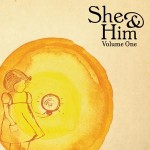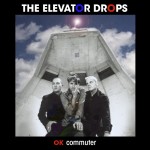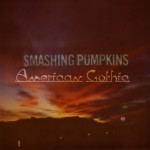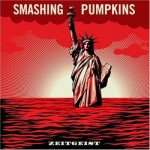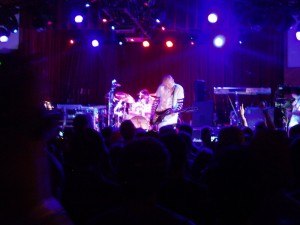
Shredding at The Orange Peel in Asheville
In the summer of 2007, the Smashing Pumpkins made their return to the United States. Instead of a traditional tour to support the release of Zeitgeist, original members Billy Corgan and Jimmy Chamberlin opted for a progressive approach. In an effort to gel the band and stimulate the musical process, they chose to do two residencies, a nine-night stint in Asheville, North Carolina and another eight-night stand (which eventually grew to eleven shows) at the historic Filmore in San Francisco.
The purpose of these shows was unique. It put both the band and fans in the same bubble, trapping the energies, both good and bad, and transferring them between fan, band, venue and town. For a $20 ticket fans were allowed in during the day to hear soundchecks, and treated to three-hour-plus shows nearly nightly. These performances saw the band playing hits, b-sides, lost favorites, reworked classics, new music, and songs written throughout the engagement and even the day of the show.
If All goes Wrong examines these residencies, watching the band evolve through the contrasting experiences of Asheville and San Francisco. More importantly, it gives an inside glimpse into their songwriting process.
Asheville welcomes the band warmly. Shots of fans and the town are intercut with live performances and the band speaking frankly about their return. A good portion of footage features Corgan secluded in his room at the Biltmore Estate, eating raw veggies and working tirelessly on songs while donning some sort of Victorian nightgown. One song, “The Leaving Lament,” is an open letter to Asheville, regretting the band’s departure.
The giddy excitement of North Carolina turns into stunning disbelief in San Francisco as their first shows lose the audience. After walking backstage for the first encore Chamberlain gasps, “Three hours of fucking quiet misery” compared to Asheville, the proverbial wheels fall off in Cali. The songwriting and drama continue as the band battles back throughout the residency. This is a strong point of the film, a vivid, unflinching look at a band in peril, showing the adversity and using it as a point of development.
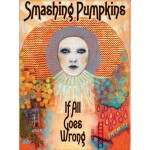
The song “Peace and Love” is born of the Filmore experience. An ironic jab at a city supposedly built on peace that is now filled with “aggro homeless hippies with trust funds.” Some 15 songs were written during the Filmore stint, each reflecting different parts of the experience. (A handful of these songs later appear on their American Gothic EP.)
The movie also looks at the group of hired musicians being molded into a band. Jeff Schroeder, Ginger Reyes, and Lisa Harriton are thrown headlong into the experience. Four hours of rehearsal, soundchecks, and three-hour shows have the band playing over eight hours a day. The group has to learn nearly 60 songs to keep up with the set lists Billy writes minutes before the shows. There is a moment when new guitarist Schroeder unravels under a series of sound issues and loses it backstage; This breakdown is seen as a milestone in their evolution as a band.
When SP debuts “Superchrist” halfway through the San Fran shows, it’s a highlight, an over-the-top guitar and drum assault which seems to lash out at critics and a tepid audience. The documentary uses this as a turning point, a place where the Pumpkins earn back the respect of the city through sheer force of rock.
We see the chords and phrasing for “The Rose March” coming to Corgan in a flash. The next day is spent flushing out the song, with shots of Corgan working on the song appear in split-screen, culminating in the song being performed that very night. Watching “99 Floors” go from concept to full-band arrangement is another high point, as the viewer watches it transform from a fly-on-the-wall perspective.
The DVD also includes Voices of the Ghost Children, a vignette featuring fans in and around the shows lending their interpretations of the band. There is also an interview with Pete Townshend, tying in The Who’s attempts at a residency in 1971. Disc 2 features 15 songs from the Filmore shows, with solid performances of “Starla” and the free-form epic “Gossamer” that are worth the price alone, as well as a rehearsal featuring five of the songs written during this period.
Love or hate the Pumpkins, If All Goes Wrong lends unique perspective to the rock documentary. It shows a storied band unapologetically surging forward, on their terms, for the sake of art.
Article originally appeared in REAX #31, January 3 2007
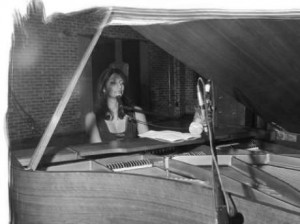
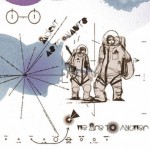


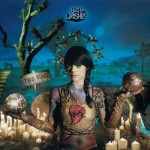 Two Suns is a sensible follow-up to her debut, taking the themes and style of the previous Рwith its haunting charm Рand expanding on it. Two Suns is sweeping and large for an “indie songstress.” Her style invokes names like Kate Bush, PJ Harvey, or Siouxsie Sioux without sounding like any of them. For instance, “Good Love” with its somber organ, tambourine and eerie vocal delivery is reminiscent of Mazzy Star without being a slavish knock-off.  “Two Planets” Рpsychedelic and experimental with its vocal twists and chilling melodies all driven by Timpani’s and hand claps Рreminds me of Bjork.  Both rich and sparse, this album is soaked in tasteful production, revealing a well produced, elegantly dark, but positively pop, gem.
Two Suns is a sensible follow-up to her debut, taking the themes and style of the previous Рwith its haunting charm Рand expanding on it. Two Suns is sweeping and large for an “indie songstress.” Her style invokes names like Kate Bush, PJ Harvey, or Siouxsie Sioux without sounding like any of them. For instance, “Good Love” with its somber organ, tambourine and eerie vocal delivery is reminiscent of Mazzy Star without being a slavish knock-off.  “Two Planets” Рpsychedelic and experimental with its vocal twists and chilling melodies all driven by Timpani’s and hand claps Рreminds me of Bjork.  Both rich and sparse, this album is soaked in tasteful production, revealing a well produced, elegantly dark, but positively pop, gem.

